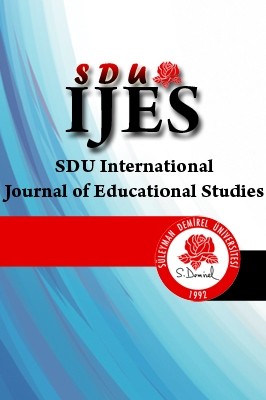Bir Ölçek Geliştirme Çalışması: Bilgisayar ve Öğretim Teknolojileri Eğitimi Bölümü Mezunları için Pedagojik Yeterlik Algısı Ölçeği
Bu çalışmanın amacı, Bilgisayar ve Öğretim Teknolojileri Eğitimi (BÖTE) Bölümü lisans mezunlarının pedagojik yeterlik algılarının belirlenebilmesi için bir ölçek geliştirmektir. Bu amaca uygun olarak ilk aşamada bölümde kazandırılan pedagojik yeterlikler belirlenmiştir. Bu amaçla bölümün lisans programı ve bölümde kazandırılan pedagojik yeterliklerle ilgili açık uçlu soruları içeren bir anket oluşturulmuştur. Bu süreçte bölümün lisans programından pedagojik yeterlikleri kazandırmayı hedefleyen “Eğitim Psikolojisi, Sınıf Yönetimi, Özel Öğretim Yöntemleri, Eğitimde Materyal Tasarımı ve Kullanımı” gibi dersler incelenerek mezunların bu derslerin kazandıracağı yeterlikleri kazanıp kazanmadıkları, kazandılarsa hangilerini kazandırdıklarına dair açık uçlu sorular hazırlanmıştır. Hazırlanan bu sorular BÖTE alanında uzman olan 3 akademisyenin görüşüne sunulmuştur. Uzmanlardan gelen öneriler doğrultusunda, “BÖTE Mezunları Pedagojik Yeterlikleri” anket formu oluşturulmuş ve pedagojik yeterlikleri belirlemeye yönelik veri toplama sürecine geçilmiştir. Ölçek formunun ilk taslağında 58 pedagojik yeterlik maddesi bulunmaktadır. Ölçek maddeleri arasında ters kodlanan herhangi bir madde yoktur. Analiz aşamasında öncelikle verilerin hatasız girilip girilmediği kontrol edilmiştir. Daha sonra ise verilerin açımlayıcı faktör analizi için uygun olup olmadığı incelenmiştir. Yapılan açımlayıcı faktör analizi sonucunda 5 boyut ve 30 maddeden oluşan bir ölçek ortaya çıkmıştır. Oluşan 5 boyut altındaki 30 maddenin varyansın %68.5’ini açıkladığı görülmüştür. Ölçeğin Cronbach Alpha güvenirlik katsayısı, .954 olarak bulunmuştur.
Anahtar Kelimeler:
Bilgisayar ve öğretim teknolojileri eğitimi bölümü, pedagojik yeterlikler, ölçek geliştirme, faktör analizi
A Scale Development Study: Computer Education and Instructional Technology Graduate's Perceived Pedagogical Competency Scale
The aim of this study is to develop a scale to determine the perceived pedagogical competence of Department Computer Education and Instructional Technology (CEIT) graduates. The development of the Computer Education and Instructional Technology Graduate’s Perceived Pedagogical Competency Scale was carried out in five stages. At the first stage, it is aimed to determine the targeted pedagogical competencies gained in the department. For this purpose, a questionnaire which included open-ended questions about the undergraduate program and the pedagogical competencies gained in the department was developed. Some courses which aim to give pedagogical qualifications from the undergraduate program like "Educational Psychology, Classroom Management, Special Teaching Methods, Design and use of Materials in Education" etc. were examined. After that open-ended questions were prepared. These questions were presented to 3 academicians who are experts in the field of Computer Education and Instructional Technology. In line with the suggestions received from the experts, a questionnaire form was developed for "Pedagogical Competencies for the Graduates" and the data collection process was started to determine the pedagogical competencies The first draft of the scale form contained 58 pedagogical qualifications’ items. Among the scale items, there is no item that is encoded inversely. During the analysis first, it was checked to make sure that the data were entered without any errors. Then, it was examined whether the data were suitable for explanatory factor analysis. As a result of the exploratory factor analysis, a scale consisting of 5 factors and 30 items emerged. The result of the explanatory factor analysis reveals 68.5% of the total variance of the five factors emerging. The Cronbach Alpha reliability coefficient of the scale was found to be .954. According to this result, it is possible to say that the scale is a reliable scale and it can be used by researchers.
Keywords:
Department of Computer Education and Instructional Technology, pedagogical competency, scale development, factor analysis,
___
- KAYNAKÇAAkkoyunlu B. ve Orhan. F. (2003). Bilgisayar ve öğretim teknolojileri eğitimi bölümü öğrencilerinin bilgisayar kullanma öz yeterlik inancı ile demografik özellikleri arasındaki ilişki. The Turkish Online Journal of Education Technology, 2(3).
- Bandura, A. (1977). Self-efficacy: Toward a unifying theory of behaviour change Psychological Review, 84, 191–215.
- Bandura, A. (1995). Exercise of personal and collective efficacy in changing societies. In A. Bandura (Ed.). Self-efficacy in changing societies (pp. 1-45).New York: Cambridge University Press.
- Bandura, A. (1997). Self-efficacy: The exercise of control. New York: W. H. Freeman and Company.
- Kear, M. (2000). Concept analysis of self-efficacy. Graduate Research In Nursing. [Çevrim-içi: http://graduateresearch.com/Kear], Erişim tarihi: 10 Nisan 2014.
- MEB (2012). Millî Eğitim Bakanlığına bağlı eğitim kurumlarına öğretmen olarak atanacakların atamalarına esas olan alanlar ile Mezun oldukları yüksek öğretim programları ve aylık karşılığı okutacakları derslere ilişkin esaslar. [Çevrim-içi: http://personel.meb.gov.tr/upload/Kimler_ogretmen_olur.pdf], Erişim tarihi: 11 Mayıs 2014.
- MEB (2008a). Bilişim teknolojileri öğretmeni özel alan yeterlikleri. [Çevrim-içi: http://otmg.meb.gov.tr], Erişim tarihi: 11 Mayıs 2014.
- MEB. (2008b). Öğretmen yeterlikleri. Öğretmenlik mesleği genel ve özel alan yeterlikleri. Ankara: Devlet Kitapları Müdürlüğü.
- Pajares, F. (2002). Overview of Social Cognitive Theory and of Self-Efficacy.[Çevrim-içi http://www.uky.edu/~eushe2/Pajares/eff.html] Erişim Tarihi 23 Temmuz 2014.
- Pajares, F. & Schunk, D.H. (2001). Self Beliefs and school success: Self efficacy, self concept, and school achievement. In R.Riding& S. Rayner (Ed.), Self-perception (239-266). London : Ablex Publishing
- Seferoğlu, S. S. (2007). İlköğretim bilgisayar dersi öğretim programı: Eleştirel bir bakış ve uygulamada yaşanan sorunlar. Eğitim Araştırmaları-Eurasian Journal of Educational Research, 29, 99-111
- Senemoğlu, N. (1997). Gelişim, öğrenme ve öğretim: Kuramdan uygulamaya. Spot Matbaacılık, Ankara.
- Schunk, D. H. (2009). Öğrenme teorileri eğitimsel bir bakış (Çev. Ed. M. Şahin).Ankara: Nobel Yayın Dağıtım
- Şahin, A. E. (2004). Öğretmen yeterliklerinin belirlenmesi. Bilim ve Aklın Aydınlığında Eğitim Dergisi, 5, 58.
- Tabachnick, B. G., & Fidell, L. S. (2001). Using multivariate statistics. 4th edition (Boston: Allyn and Bacon)
- Tavşancıl, E. (2014). Tutumların ölçülmesi ve SPSS ile veri analizi. Ankara: Nobel Yayın Dağıtım.
- Tschannen-Moran, M., & Woolfolk-Hoy, A. (2001) Teacher efficacy: Capturing an elusive concept. Teaching and Teacher Education, 17, 783-805
- Zimmerman, B. J. (1995). Self-efficacy and educational development. A. Bandura (Ed.).Self-efficacy in changing societies (pp.202-231). New York: Cambridge University Press.
- Başlangıç: 2014
- Yayıncı: Süleyman Demirel Üniversitesi
Sayıdaki Diğer Makaleler
Matematik Öğretimi Öz Yeterlik İnancı Ölçeğinin Geliştirilmesi
Sosyal Bilgiler Öğretmen Adayları İçin Farklı Bir Deneyim: Araştırmacı Öğretmen Modeli
Nadire Emel AKHAN, Serpil DEMİREZEN
Sosyal Bilgiler Öğretmen Adaylarının Tarih Bilinci ve Tarih Derslerindeki İlgi Alanları
Esma UYSAL, Ümran Betül CEBESOY
Öğrenciliğe Dönük Tutum Ölçeği (ÖDTÖ) Geliştirme Çalışması
Cemal Hakan DİKMEN, Doç.dr. Mehmet Akif OCAK
Öğretmen Performans Değerlendirmesine İlişkin Görüşlerin İncelenmesi
